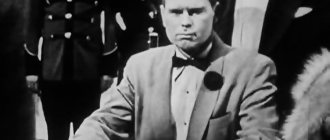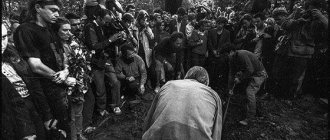Biography
On January 17, 1942, housewife Odessa Clay gave birth to a son in Louisville, Kentucky. The boy was named after his father, an artist by profession, Cassius Jr. However, the world recognizes him under the pseudonym Muhammad Ali. Cassius's brother Rudolf, who appeared to the couple 2 years later, having matured, will also change his real name to Rahman Ali.
Their family was never in need, representing the middle class, although the living conditions of the white and black populations differed. The father of the family made a living by painting signs, his wife periodically worked part-time by cooking and cleaning in rich houses. The budget was even enough to save money for a cottage in a very good “black” area.
Muhammad Ali as a child
The childhood and youth of the future champion were far from cloudless. In the 1950s, there was a very difficult atmosphere of inequality in America. Even 10-year-old Cassius felt the pressure and fell asleep crying, not understanding why blacks were considered second-class people. The father made his contribution to his sons’ worldview by showing them photographs of Emmett Till, a black teenager brutally killed by whites, who were later found but not imprisoned. Ironically, Odessa Clay was proud of her white Irish grandfather. And although the images of white “rapist slave owners” will forever settle in the head of Cassius Jr., which he liked to say from the stands, his Irish ancestor had nothing to blame for - he entered into a legal marriage with his black lover.
Muhammad Ali with his family
After 12-year-old Clay's favorite bicycle was stolen, he threatened to beat the offenders. A white policeman and part-time boxing coach he met, Joe Martin, reasonably remarked that “before you beat someone, you first need to learn how to do it.” And Cassius began to study, taking his brother along for training.
It was hard to train Cassius: he bullied others a lot, constantly shouting that he was the best athlete and the future champion. Joe Martin even often kicked him out of the gym, and none of the coaches could see much potential in the guy.
Muhammad Ali in his youth
6 weeks after the boy joined the section, the first fight took place. To Cassius's particular delight, the fight was broadcast on television. Despite his lack of experience, the future Muhammad Ali defeats his white opponent, and his joy knows no bounds. He shouts at the camera that he will become a great boxer. From that moment on, the real work on myself began.
Death of a world boxing star
According to the official conclusion, death was caused by natural causes. It is known that since 1984, the athlete began to develop Parkinson's disease - one of the most typical diseases in men participating in battles and receiving strong blows to the head. According to some reports, Ali received more than 29,000 blows. Despite this, the attending physician of the Ali family denied the connection between the disease and the boxer’s activities. According to him, the athlete experienced some problems with walking, but overall his condition was satisfactory.
The warning signs began back in 2013, when Mohammed's brother Rahman told the press that the boxer had lost the ability to speak and could die within days.
In the winter of 2014, Muhammad was taken to a hospital with a mild form of pneumonia, and in 2020 he was found unconscious on the floor of his house. Doctors diagnosed inflammation of the urinary system, but the disease was not regarded as serious, so the man was discharged after 3 days.
On June 1, 2020, the boxer was brought to the clinic with breathing problems. Experts link this condition to long-term Parkinson's disease. Such a disease can create a barrier to the fight against viruses and other unpleasant processes attacking the body - in particular sepsis.
The condition was assessed as critical: the patient was not even transferred to another department - there was no confidence that Ali would survive the transportation. Numerous relatives of the greatest athlete gathered in the ward, and on the evening of June 3 he died.
According to the boxer's daughter Hana, her father's heart beat for about half an hour after all organs stopped working.
This amazing fact symbolizes the inner strength and love of life that Mohammed Ali, who became a legend in the world of boxing, possessed.
https://youtu.be/ElrhbaYaoHg
Boxing
In 1956, he won the Golden Gloves tournament, which can be considered an excellent start to his career. 100 victories in the amateur ring and only 8 defeats by the time he graduated from school. However, the young boxer studied very poorly, and he owed his school education only to the diligence and understanding of the director. It was so bad that Muhammad Ali forever had trouble reading.
Boxer Muhammad Ali
In 1960, Cassius, dreaming of a dizzying sports career, received an invitation to participate in the Olympic Games. The boxer's signature style began to emerge. The innovator seemed to “dance” around his opponent on his toes, and his lowered hands provoked a blow, which he always dodged. He was often criticized for both his fighting style and his boastful manner of presenting himself.
Only the fear of flying could stop his pressure. The boxer was so afraid to fly to Rome that he almost abandoned the Olympic Games. Cassius took the plunge by purchasing a parachute. Clay confidently reached the final and in a difficult match defeated the Pole Zbigniew Pietrzykowski, earning a gold medal.
Muhammad Ali in the ring
The father was proud of his son and even painted the steps in the color of the US flag. However, nothing has changed in his hometown. And when the champion came with a gold medal to a local cafe that did not serve “colored” people, they still refused to serve him.
Boxer Muhammad Ali hired 11 managers early in his career. He came to professional boxing on October 29, 1960, when he fought with Tanny Hunsecker. Ali prepared diligently for the fight, although he declared that Hunsecker was a slacker and victory would be easy. Victory was truly his. The enemy predicted the world championship for him.
To train with new trainer Angelo Dundee, Clay moves to Miami. There are no authorities for him, but Angelo found an approach. He respected his ward and did not try to control him in everything, but only skillfully directed him.
Muhammad Ali in Moscow
Clay looked for mentors not only in sports. The beginning of the 60s was the time of his spiritual search. In 1962, he met the leader of the Nation of Islam himself, Muhammad, and became a member of the organization, which greatly influenced his life.
That same year, while continuing to win battle after battle, he voluntarily passed a commission, but never entered the army. Having passed all the physical health tests, he failed the mental ability test, failing to answer the question of how many hours a person works from 6 a.m. to 3 p.m., including an hour for lunch. Clay liked to joke:
“I am the greatest, not the smartest!”
In six months in 1962, boxer Muhammad Ali won 5 victories by knockout.
55,000 people came to the stands to watch the fight between Muhammad Ali and Henry Cooper. A few seconds before the end of the fourth round, Cooper sent Ali into a heavy knockdown. And if Ali’s friends had not torn the glove, buying a little time for the champion to rest, it is unknown how the fight would have ended. In the 5th round, Muhammad cut Cooper's eyebrow with a blow, and the fight was stopped.
Muhammad Ali and Mike Tyson
The match between Ali and Liston was entertaining and difficult. Ali outplayed the current world champion, who had a cut on his eyebrow and a serious hematoma. By the fourth round, Ali could no longer see, but the coach insisted on entering the ring and he was right - his vision returned, and boxer Muhammad Ali became the world heavyweight champion.
In subsequent years, Muhammad Ali became “Boxer of the Year” 5 times and deserved the title of not only “Boxer of the Decade,” but also of the Century. In the early 90s, he entered the International Boxing Hall of Fame to forever remain a legend of the sport.
Why are we lower than them?
In the city of Louisville, where Clay was born in 1942, the treatment of blacks was very lousy even for those times: separate toilets, lack of service in restaurants and other signs of racism in the spirit of the fifties. One hot day, ten-year-old Cassius and his mother, Odessa Clay, were waiting at a bus stop; the boy was thirsty, and the woman knocked on the nearest cafe to ask for a glass of water for her son. They answered her with a sharp aggressive refusal and slammed the door in her face. Such situations happened more and more often, and this greatly affected little Cassius, who cried in the evenings and asked a simple question: “why are we lower than them?”
Cassius is only 13 years old.
All his life, Mohammed was haunted by racism - from everyday to ideological. No matter how many medals he had on his chest, they still refused to serve him in restaurants, no matter how many championship belts he wore, he was always looked at askance and with hostility. All these stares and humiliating attempts to gain respect made Clay question whether he was doing everything right in his life.
Personal life
Muhammad Ali was married 4 times. He separated from his first wife in his early youth because of her reluctance to become a Muslim. The second wife Belinda Boyd (after the marriage of Khalil Ali) gave birth to her husband four children. However, Ali was not an exemplary husband, and his infidelities became the reason for the couple’s divorce.
Muhammad Ali with his wife
His mistress Veronica Porsche married him, becoming his third wife in 1977. The marriage lasted 9 years. But Muhammad did not remain alone for long, marrying his close friend Iolanthe Williams. They even adopted a child. In addition to his legitimate children, Muhammad has two more illegitimate daughters.
Bold Challenger Shocks the Champion
Ali looked exhausted as he entered the ring. Spinks was relaxed and full of confidence. From the first seconds, Leon unleashed a hail of blows on his opponent. Ali pressed himself against the ropes, taunting his opponent and asking him to throw more punches. To somehow slow down Leon's frantic activity, Mohammed resorted to dirty tricks - the referee constantly warned Ali for holding Spinks by the neck.
There was a feeling that Spinks would finish Ali in the second round. From time to time, Mohammed danced in the ring, rising on his toes. But Leon patiently ran after him and often threw punches - his advantage was undeniable.
In the third round, Ali again turned to Spinks: “Keep going, keep going.” Leon responded by driving his opponent into a corner and began to work with both hands - Ali was only defending himself.
Spinks continued to build his lead in the fourth round. He hit him right in the jaw twice. “The People’s Champion” tried to fight back, but Spinks was so fast that the champion’s punches flew wide. Mohammed began to get lost, and the referee again warned: “Get your hands off his neck, Ali!”
In the fifth round, Ali went on the attack. The champion tried to find flaws in his opponent's tactics. And Spinks already had to feel like a punching bag - Leon missed two good jabs from Ali.
But Spinks was stubborn. He walked forward. At some point, it began to look like a street fight - both boxers were not shy about exchanging.
Closer to the ninth round, the fighters began to get tired, although sometimes both managed to carry out a couple of good attacks. For example, Spinks cornered Ali and rocked him with a powerful uppercut. Mohammed lowered his hands and began to miss punches. However, in the end the champion came to his senses. He hit Leon's face twice - only the gong saved him from falling. In Ali's corner, everyone was happy: he was asked to “close the show.”
Mohammed tried to do it in the tenth round. He pinned Spinks against the ropes and hit him with punches from all angles. Spinks' head twitched like a spring. “I waited for him to run out of gas,” Ali later said. “But that never happened.” Ali did not maintain control of the fight. Spinks got tired of receiving and went on the attack - the advantage again went to his side.
In the 13th round, Ali looked tired and his face was swollen. He tried to land a punch, but Spinks responded instantly. Leon continued to walk forward. In the 14th there was an exchange of blows again. Coming into the final round, it looked like the title was in Spinks' hands. Ali came out angry. He attacked Spinks with all his arsenal. Ali tried to rectify the situation, but it was too late. Spinks dominated the final 30 seconds of the fight. He rocked the champion with a left uppercut to the sound of the gong. There were shouts of joy from Spinks' corner.
Ali shook his head as he returned to his corner. He looked depressed. The champion understood: he had just lost the title. The judges gave the victory to Spinks. After the fight, Ali said he felt lost due to poor tactics: “In the first four rounds, my strategy was bad. She worked with Fraser, Foreman and Norton, but not with Spinks. He didn't hurt me as much as Frazier or Foreman. I had no right to lose."
Death
At the end of May 2020, the world boxing legend was urgently hospitalized due to breathing problems. He spent several days in one of the hospitals in Phoenix, where Muhammad Ali lived in recent years. But it was not possible to save him.
Muhammad Ali in recent years
Muhammad Ali died on June 4, 2020. He turned 74 years old. The athlete's main disease was Parkinson's disease.
Biography of Muhammad Ali
Muhammad Ali (real name Cassius Marcellus Clay) is a true legend of world boxing. “Float like a butterfly, sting like a bee” - his motto determined the course of this sport for many years to come, becoming the basis for thousands of trainers and boxers around the world. Muhammad Ali was not just a boxer - he was a man who turned the history of world boxing in a new direction. During his career, he fought 61 fights, of which 56 were crowned with victory.
Mohammed Ali - world boxing legend
Probably, today there is hardly a person in the world who has never heard of the “People's Champion”, the brilliant heavyweight of the 60s and 70s. But is it worth saying that Muhammad Ali is a person about whom absolutely everything is known? Of course not. After all, the human soul is a city in which the light is rarely turned on.
Debut in professional boxing
Clay's first professional boxing opponent was Tanny Hunsecker. Cassius conscientiously prepared for the fight: he ran at least 2 miles every day and sparred with his younger brother.
Before the fight, in his traditional manner, Clay bullied Hunsecker, calling him a “bum” and promising to quickly deal with him in the 6th round. Cassius managed to win, but the promised quick reprisal did not work out. Tunney said after the fight that he was lucky to fight the future World Champion .
"Thriller in Manila"
And finally, another significant fight of Muhammad Ali - the third meeting in the ring with Joe Frazier. This happened on October 1, 1975. The fight took place in an equal fight, and first one side, then the other, had the initiative. And at times this fight resembled a “street fight”, in which they relied more on the force of the blow.
The denouement occurred in the 14th round. Fraser suffered a large hematoma on his face. He practically lost the ability to see. And when the referee showed him three fingers and asked him to count them, Joe couldn’t do it. The judge stopped the fight and awarded the victory to Mohammed Lee. But the trick is that Ali himself by this moment had practically lost the ability to continue the fight. He was so tired that he hardly came out for the last round. And after declaring him the champion, Lee even fainted in his corner. It is not surprising that the controversy surrounding this fight has not subsided to this day. Many are wondering who would have won if the referee had not stopped the fight.
Second fight with Liston
On May 25, 1965, a rematch took place between Muhammad Ali and Sonny Liston in the small town of Lewiston. The odds were in favor of the old champion.
Nobody expected what happened in the ring: in the 2nd minute of the first round, Ali knocked Liston out. Even Mohammed himself believed that Sonny was deliberately set up, and said so in the post-match interview.
However, the fight was won and the young champion defended his championship title for the first time. There were no serious opponents among boxers for him at the moment.
Subsequently, until the spring of 1967, Ali was able to defend the world heavyweight champion title 8 times
“If I had not converted to Islam, the world would never have known Muhammad Ali.”
Muhammad Ali is an American professional boxer who competed in the heavy weight category; Champion of the XVII Summer Olympic Games in 1960 in the light heavyweight category, absolute world champion in heavyweight (1964-1966, 1974-1978). He is one of the most famous and recognizable black boxers in the history of world boxing. Muhammad Ali’s merits in sports are significant, and his contribution to the development of Islam is a separate topic for discussion.
“I’ve never boxed just to win.”
Muhammad Ali's childhood coincided with a time when an atmosphere of racial inequality reigned in the United States, and blacks were constantly belittled and mocked. It was racial inequality among the population that greatly influenced the formation of the personality of 10-year-old Cassius. The little champion was worried about the following questions: “Why are white people allowed to do everything, but black people have many restrictions? After all, in fact, all people are equal,” “Why is everything good white and bad everything black?” This state of affairs had a strong effect on Muhammad that he wanted to get out among the people and prove his importance to everyone, and he began to train in the boxing section. For him, just doing boxing was not enough, he believed that he had to be the best in boxing in order to gain acceptance from the white people. In fact, Muhammad Ali, at age 18, became America's first black heavyweight athlete.
In 1960, he received an invitation to the Olympic Games, and when it turned out that it was impossible to sail by ship, he told his coach that he was refusing to participate in the Olympic Games because he suffered from aerophobia (fear of flying). The coach convinced him: “This competition is a very important event for you, if you win the Olympic Games, everyone will listen to your words.” As a result, Cassius agreed to fly, but he agreed to take all precautions, namely purchasing a parachute and staying in it throughout the entire flight. He had no equal in the Olympic Games.
During the presentation of the awards, 18-year-old Muhammad Ali, standing on the championship podium, looking at his white rivals - a Pole and a Russian, was happy.
So, at the airport of his native Louisville, he was met by the mayor of the city and hundreds of fans, but he almost immediately learned another lesson - the gold medal around his neck, which Cassius did not part with at first even while sleeping, did not lead to success in the fight against discrimination. With a medal on his chest, the champion entered a diner with a typical American sign at the time: “Whites Only.” “I thought,” he recalls, “that I would put them in their place, after all, the winner of the Olympics.” But I heard: “We don’t serve it to blacks.” “It’s okay,” the 18-year-old talent responded, “I’m not a beggar.” However, he ended up being put out on the street. After this, Cassius headed to the Ohio River, where he sent to rest his gold medal, which he had won for the country.
After this incident, Muhammad Ali's real struggle began. “I never boxed just to win. I had a goal: To achieve success in order to make people listen to my words. I knew that people all over the world were looking at me,” Muhammad Ali admitted in one of his interviews.
What brought Muhammad Ali to Islam was not a spiritual path, but the discovery of subtleties in this religion that coincided with the ideas of the struggle for racial equality, because while attending church, white and black Christians were unable to achieve equality among themselves, which aroused his interest in Islam.
How did Muhammad Ali convert to Islam?
In 1959, in Chicago, Cassius Clay first heard Nation of Islam leader Elijah Muhammad speak. At that time, this organization was dedicated to protecting the rights of black people and calling for economic and religious freedom. A year later, while training in Miami, he met Abdul Rahman. According to Muhammad Ali, this follower of Elijah invited the boxer to listen to his lecture “on the history of our ancestors” in the mosque. Together they went to the local mosque. This excursion greatly influenced the young man, he said: “For the first time I felt spirituality in my life when I entered this Muslim temple in Miami.” Afterwards, Clay began to regularly read the newspaper “Muhammad Speaks,” and more and more often he thinks about the meaning of life, the purpose of man.
Before the start of the first fight for the world heavyweight title with the famous Sonny Liston in February 1964, Cassius, together with his brother, prayed to Allah. And after winning that meeting, he officially announced his acceptance of Islam and joining the “Nation of Islam.”
Then the champion was 22 years old. Later in one of the interviews, when Muhammad Ali was asked if he regrets anything in his life? - he replied:
- Yes, definitely. If I were given the chance to live my life again, I would convert to Islam at the age of ten.
“If I were given the chance to live my life again, I would convert to Islam at the age of ten.”
Born Cassius Marcellus Clay, he converted to Islam in 1964 and changed his name to Muhammad Ali. At first, reporters ignored his new name and called him what they used to call him - Cassius Clay, but he began yelling in everyone's ear: “My name is different! I am Muhammad Ali." Now the whole world knows him as Muhammad Ali, and not everyone remembers his former name. “If I wasn’t a Muslim, I wouldn’t have achieved everything that I have. If I were not a Muslim, I would not change my name and spread goodness. I wouldn’t be who I am if I hadn’t become a Muslim, the world would never have known Muhammad Ali,” admits the champion.
“There have been wonderful moments in my life. But the feeling that I experienced when I stood on Mount Arafat during the Hajj was incomparable.”
With the adoption of Islam, the purpose of Muhammad Ali's life changed. Public reaction to the news was largely negative. Ed Lassman, president of the WBA, said: "Clay has damaged the boxing world... and sets a bad example for young people." He tried to strip Ali of his title. But Muhammad was adamant. If earlier he “needed to show the world” how “great” he was, then with the advent of the Muslim faith this need completely disappeared by itself. For the reason that “my spirituality” developed, and from that time “all I need is to ask myself whether God will be pleased with me.” “The world championship did not bring me happiness,” exclaims the unsurpassed Master, since true happiness comes from God. “After death, it doesn’t matter how much money I earned, how educated I was,” sums up Muhammad Ali, “the most important thing is prayer and good deeds during life, because being on earth is practice before eternal life.”
And after that, having achieved considerable success in life, Muhammad Ali associated all his achievements with Islam. And he tirelessly repeated that he considered the greatest success in life to be his acceptance of Islam. He tries with all his heart to fulfill all the requirements of religion.
This is what Ali said in one of his interviews after he converted to Islam: “There were wonderful moments in my life. But the feeling that I experienced when I stood on Mount Arafat during the Hajj was incomparable. I was surrounded by an indescribable spiritual atmosphere in this place, where more than one and a half million Muslims cried out to God, begging Him to forgive them their sins and bestow His blessings. It was a very moving moment to see how people of different colors and nationalities, kings, heads of state and people from the common people, all dressed in two pieces of simple white cloth, prayed to God, abandoning any sense of pride and superiority. This was a practical manifestation of the concept of equality in Islam."
No matter how world champion he was, he tried to avoid feelings of pride. After all, he did not consider it a humiliation to apologize to his opponent for past mistakes, for the fact that in his youth, before matches, he insulted Joe Frazier and swaggered over him, saying that “freaks cannot be champions, champions must be beautiful like me.” Thirty years later, I apologized to him for my behavior - and he accepted my apology,” said the champion.
“Killing innocent people is against my religion.”
Next came another test, when Ali had to decide on a specific step. Not an ideological, not a theoretical, but a practical step that could cost him his professional career.
In the second half of the 1960s, at the height of the Vietnam War, Ali, drafted into the US Army, refused to fulfill his military duty. He justified this, as is known, by his own position - he assessed the Vietnam War as unjust and killing an innocent person was contrary to the requirements of his religion.
The boxer recalls this event from his life in the following words: “After I received a summons calling for participation in the Vietnam War, everyone advised me to agree. However, my religious beliefs were not compatible with the duties of a soldier in battle. I disagree with the reasons the US Army fought in Vietnam. I couldn't bring myself to hurt or kill people I don't even know. People who have never caused any harm to me or my country. I just couldn't do it. I think that this was destined for me by God. Many people said that I was afraid to go to war. In reality, standing up for my religious beliefs against the United States government and the millions of people who turned against me was more difficult. The government offered me all kinds of deals. They said I would never have to hold a gun. They said I would never go near a war zone. Even if this were true, I still would not be able to go to war. They wanted to use me so that other young Americans would follow my example. They don't seem to understand that by agreeing to this deal, I would be forced to renounce my religion, faith and beliefs. I decided to be true to myself and to God. If I turned my back on my religious beliefs, my whole life would be like a ship set out on the open sea without a rudder. Nothing could be worse for me than trying to live without faith.”
Although many tried to portray this step as a fear of going to the front, neither public opinion nor the threat of excommunication from boxing due to refusal to join the army scared Muhammad Ali. As a result, he was suspended from his professional career for three years. His return to the ring was, of course, a triumph. He became a champion again. Because he always was and remains one.
Terrorist attacks do not represent my religion
The tragic events of September 11, 2001 shocked the world, but it hit American Muslims especially hard. After this tragic event, most Americans began to associate Islam with terrorism. The athlete, noticing the formation of a negative attitude towards Islam, chose not to remain silent. He addressed the people with the words: “I am a Muslim. I've been a Muslim for 40 years... You know me. I'm a boxer. They call me the greatest. You know me as a boxer and as a truthful person. I would not imagine Islam if it was on the side of terrorists... I think that all people should know the truth and come to an understanding of the truth. Islam is peace.
"I am Muslim. I am American. As an American Muslim, I express my deepest condolences for the events of September 11, 2001.
Islam is a religion of peace and tranquility. Islam does not support terrorism or killing people.
I cannot sit quietly and allow people around the world to think that Islam is a religion of murderers. It pains me to see what radical people can do in the name of Islam. These people commit acts that are contrary to the laws of God. Muslims are against cruelty.
If the perpetrators of all this are truly Muslims, they have trampled the teachings of Islam. The terrorist attack in the US in no way represents Islam. God is not on the side of the terrorists. Whoever did this must pay for his evil.”
The speech of such an influential person as Muhammad Ali helped many Muslims to perk up.
In 1998, Muhammad Ali became the UN Messenger of Peace, and four years later he went to Afghanistan. Here he “immediately felt a semblance of harmony with the country and its inhabitants,” feeling at home. Everyone around “was my brothers and sisters.” But Muhammad Ali was very worried about the Afghan children in the conditions of constant instability in the country. And he wrote them a letter in which he urged them to adhere to three aspects on the path of formation: faith in God, compulsory study and obtaining a quality education and achieving physical strength. This is how he described his trip: “I became a United Nations Messenger of Peace. This was very important to me. Many will be surprised to know that, as a boxer, I have always been against violence of any kind. This may be funny, but it is true. I always tried not to hurt my opponent, tried not to hurt my opponent, so when I heard this news, I was overly proud. In November 2002, I visited Afghanistan on a three-day mission. When we arrived, I immediately felt some kind of harmony with the country and the local people. This is a Muslim country, and despite the danger, I felt at home. Everyone around me was my brothers and sisters. I loved hugging and kissing all the children. They seemed to be entertained by the tricks I showed them. Islam teaches not to cheat, so all those little children who may have believed that I was actually making the scarf disappear had to be told the secrets of the tricks. It was difficult for me to leave my children. They were all so pure and innocent. I prayed that they would be able to keep all this in their country. I hoped their future would be brighter than their past."
From this incident in his life it can be understood that Muhammad Ali also loved children very much, like the Prophet (peace and blessings of Allaah be upon him). The proof is in the following words of the champion: “When I am close to my sons and daughters, when I talk to them, I feel closer to Allah Almighty.”
What is Muhammad Ali doing now?
“We are all so small in the vast universe created by God,” he liked to repeat, drawing a parallel with the sensations of a person on an airplane when, upon takeoff, passengers see houses or cars in a reduced size. Everything on earth becomes the size of an ant. So what can we do? Therefore, everyone’s life depends on God, who provides signals, including to Muhammad Ali, “how and where to move.”
I wonder if he knows that he has made significant contributions to the Islamic religion?
Muhammad Ali became a model Muslim for all people around the world.
Ali inspired many of his compatriots to embrace Islam. He dedicated himself to doing good: “Before I go to bed, I always ask myself if I will be proud of how I lived today if I don’t wake up in the morning. I have always tried to do a lot of good things. As much as I can. At least sign an autograph or shake someone's hand. I'm just trying to make people happy and go to heaven. I'm not perfect. I know I still have a lot to change, and I'm working on it. There are some things I've done that I'm not proud of. Especially when I hurt other people. For this I ask God’s forgiveness.”
How are you spending your time now? — one journalist once asked in an interview.
— I read a variety of books—my favorite of them, of course, is the Holy Koran. When I was young, I didn’t particularly like to read - so now I’m catching up. I help the poor, I also build gyms for children, because when I was a child, I was not allowed in them - there were signs everywhere that said “Whites Only.” But the most important goal of my life now is to praise God and promote Islam.
Muhammad Ali’s wife says the following about him: “If he did not like to read before, now he spends hours reading, reading the Koran, copying out some passages from it in order to learn them. Mainly reads Islamic literature and scientific research books and compares their contradictions with the Gospel. He gives alms to the poor so that they can buy clothes, but it is known that they take money to drink. But he still continues to give alms.”
You've only lost a fight three times in your career. How did they react to this?
“I wasn’t happy about it, but I understood that I did everything I could, gave it my best.” And if it turned out that I lost, then it was God’s will.
The boxer tirelessly calls on everyone around him and his fans to embrace Islam. About his constant call, he expresses the following thought: “The rooster crows only when he sees the light, leave him in the dark and he will never utter a sound. I see the light and I scream."
“Allah Almighty sent me illness as a test.”
Two years ago, Muhammad Ali celebrated his 70th birthday, and now he suffers from Parkinson's disease. His hearing, speech function and motor functions have deteriorated. Muhammad Ali says the following about his illness: “I am definitely being tested: will I continue to pray, will I keep my faith? God tests all great men. I will not lose my willpower, I will not lose heart. Allah Almighty sent me this disease to show that He is “first” and not me.”
Indeed, illness did not prevent him from worshiping and doing good. He made significant contributions to the funding of Islamic institutions such as the Masjid al-Fatir, the first mosque built from scratch in the city of Chicago. Truly great people, as he once said, do not want to be great, but want to help others, to be closer to God. The following advice is addressed to young people who aspire to be famous: “Be strong, read the Koran, worship God. This will certainly help you,” serve as instructions for all of us.
There are many quotes and catchphrases about Muhammad Ali, however, one of them is special: “I don’t smoke, but I continue to carry a matchbox in my pocket. When my heart slides towards sin, I light a match, bring it to my palm and then say to myself: “Ali, you cannot bear this warmth, how will you bear the unbearable heat of Hell?” Then I retreat from bad thoughts.” These words should be an example for all Muslims.
To the question “Who would you like to meet?”, Muhammad Ali replied: “With the Prophet Muhammad (peace and blessings of Allah be upon him). He adhered to the canons of Islam in difficult times, became an example for all Muslims around the world, and called for good.”
We wish him the fulfillment of his dream, to die with faith in his heart and meet the Prophet (peace and blessings of Allah be upon him) in the next world, at the bottom of the heavenly river Kausar.
Translation from Kazakh - Ainagul Dzhumagazieva
"Rumble in the Jungle"
The fight between Muhammad Ali and the then current world champion Georges Foreman received an equally loud name. And all because it took place in Africa. And this is the first such case in the history of world boxing. Before the fight started, few people bet on Ali. His opponent was younger and had 40 wins and no losses.
The meeting took place in difficult conditions. Due to the hot climate, the athletes were noticeably tired already in the first round. Around the 7th round, Ali took the initiative. He began to push Foreman to the ropes over and over again. And by the end of the eighth he carried out a deadly series of blows and sent the champion to the floor. After this fight, Muhammad Ali acquired the nickname The Greatest.
Professional career
His debut in the professional ring took place on October 29, 1960. His first opponent was Tanny Hunsecker. He lasted all 6 rounds, but could not do anything against the young athlete.
The first serious success came to Cassius in 1964. It was a fight against Sonny Liston. For the title of world heavyweight champion. The fight turned out to be very difficult. In the middle, Liston landed several powerful blows to the head. Clay even temporarily lost his sight, as his eye became very swollen. He fought for a whole round without seeing anything around him. But after that his vision returned, and Cassius carried out many crushing blows. Sonny Liston ultimately refused to continue the fight.
“It’s not victories that make a champion; they don’t become one in the gym. A champion is what is inside a person. His desire, vision and dream. Of course, you can’t do without skill. But will comes first!”
Cassius successfully defended his title for three years. And then an unpleasant event happened. Clay was drafted into the army. But he publicly refused to serve, and the International Boxing Commission stripped him of all regalia and titles. Adding fuel to the fire was the fact that by that time Cassius had already completely changed his religion, converted to Islam and chose a new name for himself: Mohammed Ali. But by the way, it was the new worldview that subsequently helped the boxer. In 1970, the court declared the sports federation's decision illegal because Ali's religious views were not taken into account. And Muslims did not have to serve in the American army.











